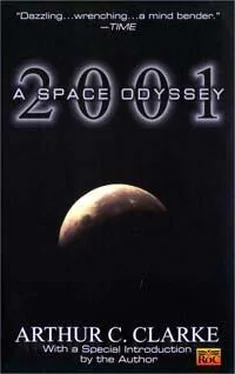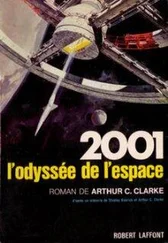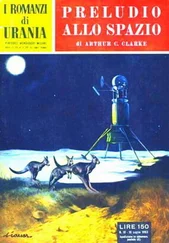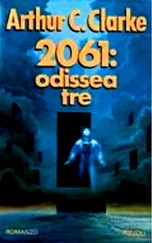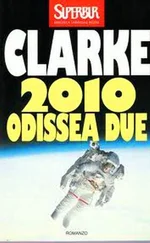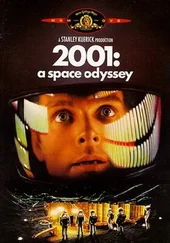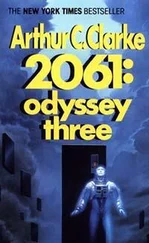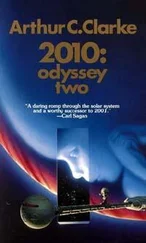"This is Betty. Start pumping sequence."
"Pumping sequence started," repeated Hal. At once, Poole could hear the throbbing of the pumps as precious air was sucked out of the lock chamber. Presently, the thin metal of the pod's external shell made crinkling, crackling noises, then, after about five minutes, Hal reported:
"Pumping sequence concluded."
Poole made a final check of his tiny instrument panel. Everything was perfectly normal.
"Open outer door," he ordered.
Again Hal repeated his instructions; at any stage, Poole had only to call "Hold!" and the computer would stop the sequence immediately.
Ahead, the walls of the ship slid apart. Poole felt the pod rock briefly as the last thin traces of air rushed into space. Then he was looking out at the stars – and, as it happened, at the tiny, golden disk of Saturn, still four hundred million miles away.
"Commence pod ejection."
Very slowly, the rail from which the pod was hanging extended itself out through the open door until the vehicle was suspended just beyond the hull of the ship.
Poole gave a half-second burst on the main jet and the pod slid gently off the rail, becoming at last an independent vehicle pursuing its own orbit around the Sun. He now had no connection with Discovery – not even a safety line. The pods seldom gave trouble; and even if he got stranded, Bowman could easily come and rescue him.
Betty responded smoothly to the control; he let her drift outward for a hundred feet, then checked her forward momentum and spun her round so that he was looking back at the ship. Then he began his tour of the pressure hull.
His first target was a fused area about half an inch across, with a tiny central crater. The particle of dust that had impacted here at over a hundred thousand miles an hour was certainly smaller than a pinhead, and its enormous kinetic energy had vaporized it instantly. 'As was often the case, the crater looked as if it had been caused by an explosion from inside the ship; at these velocities, materials behaved in strange ways and the laws of common-sense mechanics seldom applied.
Poole examined the area carefully, then sprayed it with sealant from a pressurized container in the pod's general-purpose kit. The white, rubbery fluid spread over the metal skin, hiding the crater from view. The leak blew one large bubble, which burst when it was about six inches across, then a much smaller one, then it subsided as the fast-setting cement did its work, He watched it intently for several minutes, but there was no further sign of activity. However, to make doubly certain, he sprayed on a second layer; then he set off toward the antenna.
It took him some time to orbit Discovery's spherical pressure hull, for he never let the pod build up a speed of more than a few feet a second. He was in no hurry, and it was dangerous to move at a high velocity so near the ship. He had to keep a sharp lookout for the various sensors and instrument booms that projected from the hull at unlikely places, and he also had to be careful with his own jet blast. It could do considerable damage if it happened to hit some of the more fragile equipment.
When at last he reached the long-range antenna, he surveyed the situation carefully. The big twenty-foot-diameter bowl appeared to be aimed directly at the Sun, for the Earth was now almost in line with the solar disk. The antenna mounting with all its orientation gear was therefore in total darkness, hidden in the shadow of the great metal saucer.
Poole had approached it from the rear; he had been careful not to go in front of the shallow parabolic reflector, lest Betty interrupt the beam and cause a momentary, but annoying, loss of contact with Earth. He could not see anything of the equipment he had come to service until he switched on the pod's spotlights and banished the shadows.
Beneath that small metal plate lay the cause of the trouble. The plate was secured by four locknuts, and as the entire AE-35 unit had been designed for easy replacement, Poole did not anticipate any problems.
It was obvious, however, that he could not do the job while he remained in the space pod. Not only was it risky to maneuver so close to the delicate, and even spidery, framework of the antenna, but Betty's control jets could easily buckle the paper-thin reflecting surface of the big radio mirror. He would have to park the pod twenty feet away and go out in his suit. In any event, he could remove the unit much more quickly with his gloved hands than with Betty's remote manipulators.
All this he reported carefully to Bowman, who double-checked every stage in the operation before it was carried out. Though this was a simple, routine job, nothing could be taken for granted in space, and no detail must be overlooked. In extravehicular activities, there was no such thing as a "minor" mistake.
He received the O.K. for the procedure, and parked the pod some twenty feet away from the base of the antenna support. There was no danger that it would drift off into space; nevertheless, he clamped a manipulator hand over one of the many short sections of ladder rung strategically mounted on the outer hull.
Then he checked the systems of his pressure suit, and, when he was quite satisfied, bled the air out of the pod. As Betty's atmosphere hissed away into the vacuum of space, a cloud of ice crystals formed briefly around him, and the stars were momentarily dimmed.
There was one thing more to do before he left the pod. He switched over from manual to remote operation, putting Betty now under control of Hal. It was a standard safety precaution; though he was still secured to Betty by an immensely strong spring-loaded cord little thicker than cotton, even the best safety lines had been known to fail. He would look a fool if he needed his vehicle – and was unable to call it to his assistance by passing instructions to Hal.
The door of the pod swung open, and he drifted slowly out into the silence of space, his safety line unreeling behind him. Take things easy – never move quickly – stop and think – these were the rules for extravehicular activity. If one obeyed them, there was never any trouble.
He grabbed one of Betty's external handholds, and removed the spare AE-35 unit from the carry-pouch where it had been stowed, kangaroo fashion. He did not stop to collect any of the pod's collection of tools, most of which were not designed for use by human bands. All the adjustable wrenches and keys he was likely to need were already attached to the belt of his suit.
With a gentle push, he launched himself toward the gimbaled mounting of the big dish that loomed like a giant saucer between him and the Sun. His own double shadow, thrown by Betty's spotlights, danced across the convex surface in fantastic patterns as he drifted down the twin beams. But here and there, he was surprised to notice, the rear of the great radio mirror sparkled with dazzlingly brilliant pinpoints of light.
He puzzled over these for the few seconds of his silent approach, then realized what they were. During the voyage, the reflector must have been penetrated many times by micrometeors; he was seeing the sunlight blazing through the tiny craters. They were all far too small to have affected the system's performance appreciably.
As he was moving very slowly, he broke the gentle impact with his outstretched arm, and grabbed hold of the antenna mounting before he could rebound. He quickly hooked his safety belt to the nearest attachment; that would give him something to brace against when he used his tools. Then he paused, reported the situation to Bowman, and considered his next step.
There was one minor problem; he was standing – or floating – in his own light, and it was hard to see the AE-35 unit in the shadow he cast. So he ordered Hal to swing the spots off to one side, and after a little experimenting got a more uniform illumination from secondary light reflected off the back of the antenna dish.
Читать дальше
